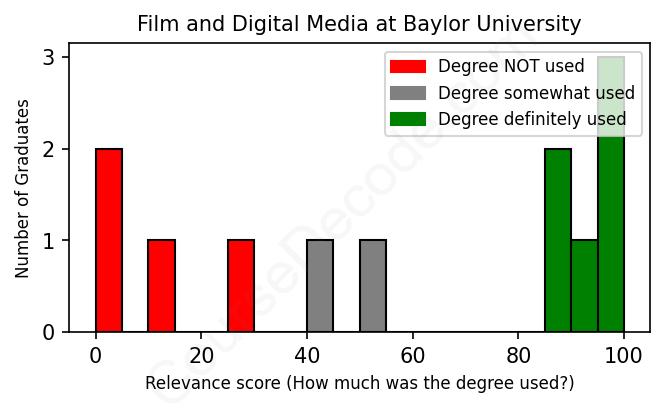
First, some facts. Of the Film and Digital Media graduates from Baylor University we've analyzed , here's how many have used (or NOT used) their degree in their career:

These are estimates based on AI analysis of 12 LinkedIn profiles (see below).
The verdict? Below average. Overall, with an average relevance score of 58%, Film and Digital Media graduates from Baylor University have a lower likelihood (-9%) of finding work in this field compared to the average graduate across all fields:
And for comparison, here's the chart for all profiles we've looked at across all degrees.
Also, after graduating, only 33% of these graduates have pursued further education other than another Bachelor's degree (such as a Masters degree or other), compared to the average across all profiles of 35%. This suggests a Bachelors degree is enough for most Film and Digital Media graduates, and it's normal to look for work straight after graduation.
See the details:
|
Relevance score: 100% We think this person has gone into a career highly relevant to their degree. We think this person has gone into a career highly relevant to their degree.
DEGREE INFOGraduated in 2013 from Baylor University with a Bachelor of Arts (BA) in Film and Digital Media. No other secondary education since. JOB HISTORY SINCE GRADUATIONVideographer University Development @ Baylor University Jan 2015 - May 2015 ABOUTOutgoingAmbitious Goal Oriented Believer |
The top 10 most common jobs done by the graduates we've analyzed (ranked most common to least) are:
When looking at the job landscape for Baylor University graduates with a degree in Film and Digital Media, there's a mix of highly relevant roles and some that stray away from the core focus of the degree. The most common positions found among these alumni tend to be centered around video production, editing, and multimedia content creation. Roles like Videographer, Video Editor, and Multi-Media Producer are prominent, showing that many graduates have found their niche in the hands-on aspects of film and digital media, directly utilizing the skills they learned in school. This is a great sign for students who are passionate about the creative and technical sides of media production, as there's a clear pathway to jobs that align with their studies.
However, not every job seems to take full advantage of the talents honed during their time at Baylor. While there are similarly creative roles that somewhat touch on digital media, like Social Media Manager or various marketing positions, many of these don't fully harness the filmmaking prowess and technical knowledge that the degree program emphasizes. This could indicate that some graduates are either diversifying their skill set or perhaps finding it challenging to break fully into their desired field. But overall, it's encouraging to see that a significant portion of these Baylor graduates are successfully landing jobs that are not only relevant but also allow them to thrive in the exciting world of film and digital media.
Here is a visual representation of the most common words in job titles for Film and Digital Media graduates (this is across all Film and Digital Media graduates we've analyzed, not just those who went to Baylor University):

It looks like graduates from Baylor University who majored in Film and Digital Media have had a pretty mixed bag of career trajectories. When you check out their first jobs, many have landed roles like videographer or video editor shortly after graduation, which makes sense given their background. Some ended up working in multimedia production or as assistants in various media companies, which could potentially lead to more significant opportunities down the line. However, not everyone stayed strictly in the media field; there are examples of grads taking jobs that veer away from Film and Digital Media, like working in retail or insurance. This indicates that while some found their way in the industry right away, others seemed to drift into unrelated areas.
Fast forward five to ten years down the road, and you see a clear divide. Some of the graduates have moved up to solid positions in media, like assistant editors, multimedia producers, and even executive roles. Others, however, have pivoted completely, with some finding success in marketing or other corporate jobs that don't relate to their field of study. It's a bit of a reality check—while some people have built good careers in film or digital media, there's a notable number who’ve had to adapt to different industries to find work. If you're thinking about this major, it's essential to stay flexible and open-minded about where your degree might take you!
Honestly, a Bachelor’s degree in Film and Digital Media tends to be pretty demanding, and Baylor University is no exception. You're definitely going to be put through your paces with coursework that mixes creative projects, technical skills, and the critical analysis of films. There's a lot of hands-on work, like shooting, editing, and understanding the theory behind what makes movies impactful, which can be super fun but also time-consuming. It's not like some majors where you can coast through, so be prepared to really invest your time and energy. Overall, it’s a bit more challenging than an average degree because of the mix of creativity and technical skills involved, but if you're passionate about it, that makes the effort worthwhile!
Most commonly, in the LinkedIn profiles we've looked at, it takes people 4 years to finish a Bachelor degree in Film and Digital Media.
Looking at the careers of these Baylor Film and Digital Media graduates, it seems like they’ve had a pretty mixed bag in terms of earning potential. Some of the folks who graduated a bit earlier, like those from the class of 2013, for example, have had decent progression in their careers, moving up from roles like videographer to multi-media producer, which can lead to solid pay, especially in established companies like Raising Cane's. Others, particularly more recent grads, have taken on freelance gigs and internships, which might not bring in as much money right off the bat. Freelancing can be hit or miss in terms of income, so it really depends on the flow of work. This field can be tough to break into, but it looks like some of them are finding their footing and growing into roles with better pay—particularly in marketing and production. Overall, while some might be making decent money, it sounds like everyone is still on their way to reaching their financial goals.
Here is a visual representation of the most common words seen in the "about" section of LinkedIn profiles who have a Bachelor degree in Film and Digital Media (this is across all Film and Digital Media graduates we've analyzed, not just those who went to Baylor University). This may or may not be useful:

Here are all colleges offering a Bachelor degree in Film and Digital Media (ordered by the average relevance score of their Film and Digital Media graduates, best to worst) where we have analyzed at least 10 of their graduates:
| College | Score | Count |
|---|---|---|
 Baylor University Baylor University
|
58 | 12 |
 University of California, Santa Cruz University of California, Santa Cruz
|
51 | 12 |